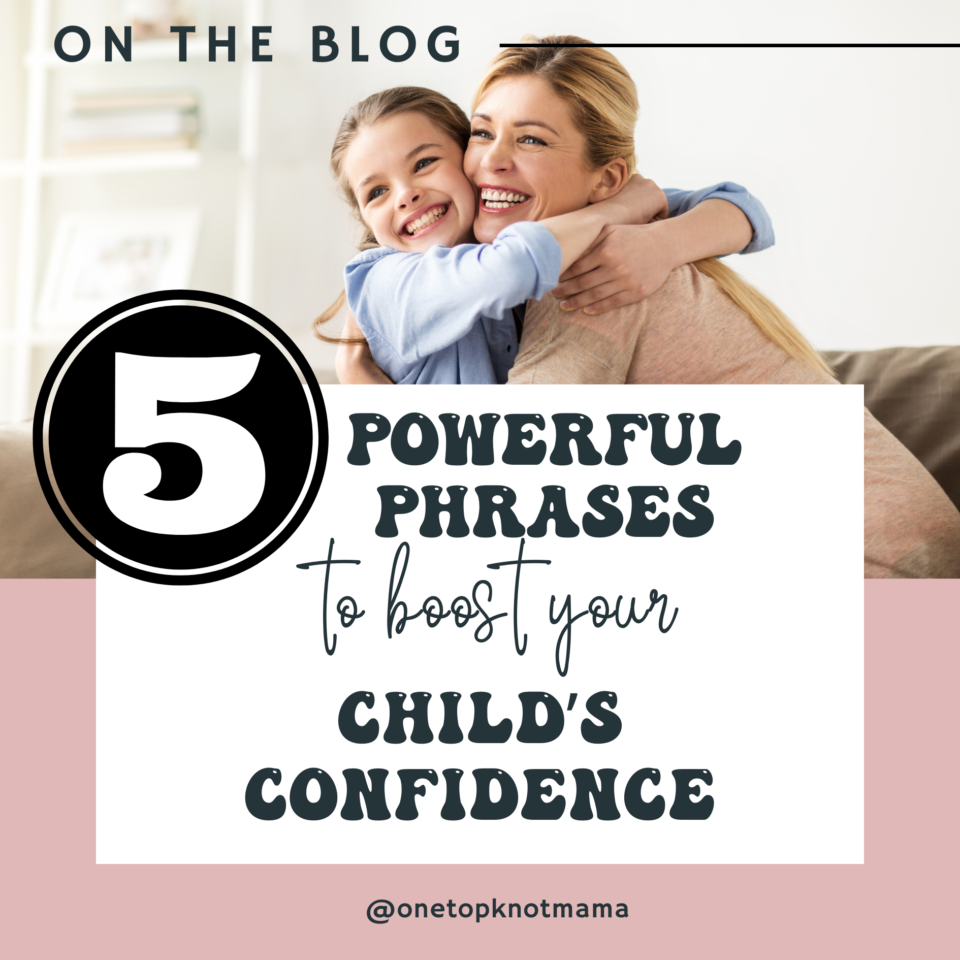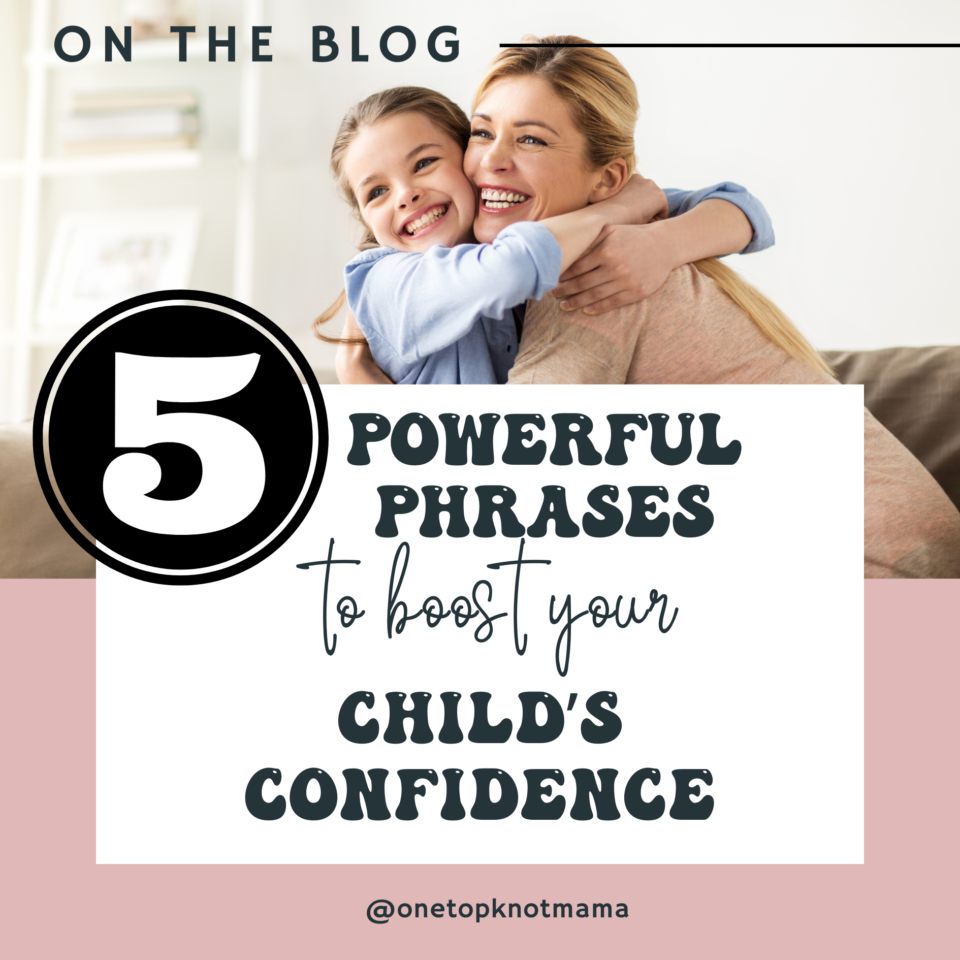Disclosure: If you click one of my shoppable links, I may earn a small commission, at no additional cost to you. I appreciate when you use my links to shop!
Hey there, One Top Knot Mamas!

Life can get pretty hectic, and sometimes we forget just how much our words can impact our little ones. Today, let’s make a conscious effort to sprinkle some extra love and positivity into our kids’ lives. Here are five things you can say to your child today to lift them up, boost their confidence and make their day a little brighter.
1. “You make me so proud.”
Kids need to hear this often. It reinforces their efforts and achievements, no matter how small. Whether they aced a test or shared their toys, letting them know you’re proud builds their self-esteem and encourages them to keep trying their best.
Remember, it’s not just about the big accomplishments; celebrating their small victories and consistent efforts can significantly boost their confidence. For example, praising their perseverance in learning a new skill or their kindness in helping a friend can make them feel valued and appreciated.
Furthermore, acknowledging their hard work rather than just the end result can teach them the importance of effort. This helps instill a growth mindset, where they learn that their abilities can improve with dedication and effort. When your child knows that their effort is noticed and appreciated, they are more likely to develop resilience and a positive attitude towards challenges.
2. “I love spending time with you.”
Letting your child know that you cherish the moments you spend together helps them feel valued and important. This simple phrase can turn an ordinary day into a memorable one, reminding them that your love is always present.
Quality time can be as simple as a walk in the park, a fun craft project, or even reading a book together. These shared experiences create lasting memories and strengthen your bond. It shows them that they are a priority in your life, fostering a sense of security and belonging.
In today’s busy world, it’s easy to get caught up in our schedules and forget the importance of quality time. However, even small moments of connection can make a big difference. Consider incorporating family traditions or regular one-on-one time with each child to ensure they feel special and loved. This could be a weekly game night, cooking a meal together, or even just having a heart-to-heart conversation before bed.
3. “You are so kind.”
Highlighting your child’s kindness encourages them to continue being compassionate and considerate. It shows that you notice and appreciate their good deeds, fostering a positive self-image and empathetic behavior.
Point out specific acts of kindness, like sharing with a sibling or helping a friend in need. This not only reinforces the behavior but also helps them understand the impact of their actions on others. Kindness is a quality that will serve them well throughout their lives, and your acknowledgment helps to nurture it.
Teaching children about kindness also involves modeling kind behavior yourself. When they see you acting with kindness and compassion, they are more likely to imitate those behaviors. Additionally, discussing stories or examples of kindness can help them understand the broader impact of their actions and inspire them to act kindly in various situations.
4. “Thank you for being you.”
Gratitude is powerful, and expressing it towards your child for simply being themselves is incredibly affirming. It tells them that they are loved unconditionally, just as they are, and that their unique qualities are what make them special.
This can be particularly comforting during times when they might feel insecure or unsure of themselves. Acknowledge their individual talents, quirks, and the unique perspectives they bring to the family. This kind of validation is crucial for developing a strong, positive self-identity.
Encouraging self-acceptance and self-love in your child helps them build a healthy self-esteem. It’s important to recognize and celebrate their individuality, which can boost their confidence and encourage them to embrace their true selves. This can be especially impactful during their formative years, when they are developing their sense of self and learning about their place in the world.
5. “I’m here for you, no matter what.”
Reassurance is key to building trust and security. Letting your child know that you’re there for them through thick and thin helps them feel safe and supported. This creates a strong foundation for them to express their feelings and seek comfort when needed.
Whether they’re facing a small setback or a significant challenge, your unwavering support provides a safety net that encourages them to take risks and grow. Emphasize that it’s okay to make mistakes and that you’re always there to help them navigate through any difficulties.
Creating an open and supportive environment where your child feels comfortable sharing their thoughts and feelings is crucial. Regularly check in with them and let them know that their emotions are valid. By being a consistent source of support, you help them develop emotional resilience and the confidence to face life’s challenges.
The Importance of Positive Affirmations
Remember, Mamas, your words have the power to shape your child’s world. So, let’s use them to build a loving, encouraging environment where our kids can thrive. Consistently using positive affirmations not only boosts their self-esteem but also helps cultivate a nurturing and supportive family atmosphere.
Positive affirmations are more than just words; they are powerful tools that can influence your child’s mindset and behavior. By regularly incorporating these affirmations into your daily interactions, you can help them develop a positive self-image and a resilient attitude. These affirmations can become a source of strength and encouragement, helping them navigate through life’s ups and downs with confidence.
Creating a Positive Home Environment
In addition to using positive affirmations, creating a positive home environment is essential for your child’s overall well-being. This includes fostering open communication, showing empathy and understanding, and setting a positive example through your actions.
Encourage your child to express their feelings and listen to them with empathy. Validate their emotions and provide guidance when needed. By creating a safe and supportive space at home, you help your child feel secure and loved.
Additionally, practicing gratitude as a family can have a positive impact on everyone’s well-being. Take time each day to share things you are grateful for and encourage your child to do the same. This simple practice can shift the focus to the positive aspects of life and foster a sense of appreciation and contentment.
Share Your Thoughts
What positive things do you say to your little ones?
Share your thoughts in the comments below!
We’d love to hear your experiences and any additional affirmations that have worked wonders in your family.



Did you know I have an Amazon storefront?
Click the button below to see all my top recommendations!
As an Amazon Associate, I earn from qualifying purchases.
CHECK OUT MY ETSY STORE THE LAPIS BOUTIQUE!
Made to Order Shirts, Mugs, Customized Gifts & More!
(Use code THANKYOU10 for 10% off your next order)


Leave a Reply